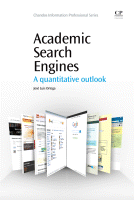Browse content
Table of contents
Actions for selected chapters
- Full text access
- Book chapterAbstract only
1 - Introduction
Pages 1-9 - Book chapterAbstract only
2 - CiteSeerx: a scientific engine for scientists
Pages 11-27 - Book chapterAbstract only
3 - Scirus: a multi-source searcher
Pages 29-45 - Book chapterAbstract only
4 - AMiner: science networking as an information source
Pages 47-70 - Book chapterAbstract only
5 - Microsoft Academic Search: the multi-object engine
Pages 71-107 - Book chapterAbstract only
6 - Google Scholar: on the shoulders of a giant
Pages 109-141 - Book chapterAbstract only
7 - Other academic search engines
Pages 143-157 - Book chapterAbstract only
8 - A comparative analysis
Pages 159-178 - Book chapterNo access
9 - Final remarks
Pages 179-181 - Book chapterNo access
References
Pages 183-192 - Book chapterNo access
Index
Pages 193-198
About the book
Description
Academic Search Engines intends to run through the current panorama of the academic search engines through a quantitative approach that analyses the reliability and consistence of these services. The objective is to describe the main characteristics of these engines, to highlight their advantages and drawbacks, and to discuss the implications of these new products in the future of scientific communication and their impact on the research measurement and evaluation. In short, Academic Search Engines presents a summary view of the new challenges that the Web set to the scientific activity through the most novel and innovative searching services available on the Web.
Academic Search Engines intends to run through the current panorama of the academic search engines through a quantitative approach that analyses the reliability and consistence of these services. The objective is to describe the main characteristics of these engines, to highlight their advantages and drawbacks, and to discuss the implications of these new products in the future of scientific communication and their impact on the research measurement and evaluation. In short, Academic Search Engines presents a summary view of the new challenges that the Web set to the scientific activity through the most novel and innovative searching services available on the Web.
Key Features
- This is the first approach to analyze search engines exclusively addressed to the research community in an integrative handbook. The novelty, expectation and usefulness of many of these services justify their analysis
- This book is not merely a description of the web functionalities of these services; it is a scientific review of the most outstanding characteristics of each platform, discussing their significance to the scholarly communication and research evaluation
- This book introduces an original methodology based on a quantitative analysis of the covered data through the extensive use of crawlers and harvesters which allow going in depth into how these engines are working. Beside of this, a detailed descriptive review of their functionalities and a critical discussion about their use for scientific community is displayed
- This is the first approach to analyze search engines exclusively addressed to the research community in an integrative handbook. The novelty, expectation and usefulness of many of these services justify their analysis
- This book is not merely a description of the web functionalities of these services; it is a scientific review of the most outstanding characteristics of each platform, discussing their significance to the scholarly communication and research evaluation
- This book introduces an original methodology based on a quantitative analysis of the covered data through the extensive use of crawlers and harvesters which allow going in depth into how these engines are working. Beside of this, a detailed descriptive review of their functionalities and a critical discussion about their use for scientific community is displayed
Details
ISBN
978-1-84334-791-0
Language
English
Published
2014
Copyright
Copyright © 2014 Elsevier Ltd. All rights reserved.
Imprint
Chandos Publishing
